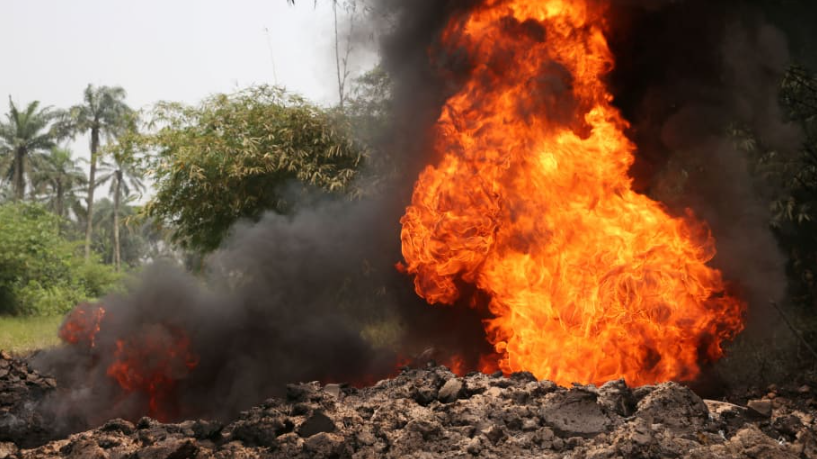Introduction
Rivers State, a key hub in Nigeria’s oil-rich Niger Delta region, has recently been plagued by a series of gas pipeline explosions, raising concerns over safety, environmental impact, and national security. These incidents come in the wake of President Bola Tinubu’s state of emergency declaration, further complicating an already volatile situation. The root causes, historical context, and global reactions to these explosions offer a deeper understanding of the unfolding crisis.
Understanding the Niger Delta’s History of Gas Pipeline Explosions
The Niger Delta, home to Nigeria’s vast oil and gas reserves, has a long history of pipeline explosions driven by multiple factors:
- Pipeline Vandalism & Oil Theft: Organized groups and local militants have frequently tampered with pipelines for illicit crude oil extraction.
- Aging and Poorly Maintained Infrastructure: Many of Nigeria’s pipelines are decades old, suffering from corrosion and lack of proper maintenance.
- Sabotage & Political Unrest: Political tensions, particularly with militant groups like the Niger Delta Avengers, have historically led to attacks on oil and gas facilities.
- Environmental and Operational Hazards: Gas leaks, accidental fires, and poorly regulated oil exploration often contribute to explosions.
A notable past incident was the 2006 Atlas Creek pipeline explosion, which resulted in over 260 deaths, highlighting the devastating consequences of these disasters.
What is Causing the Current Explosions in Rivers State?
The latest explosions in Rivers State could stem from several factors:
✅ Vandalism & Illegal Bunkering: Criminal activities targeting gas pipelines for illicit fuel siphoning have escalated due to economic hardship.
✅ Tensions Following the State of Emergency: The recent state of emergency declared by President Tinubu may have fueled unrest, leading to sabotage by aggrieved groups.
✅ Pipeline Degradation: Given the age of some oil and gas facilities, structural failures could have triggered accidental explosions.
✅ Operational Failures & Gas Leaks: Poor monitoring of gas pipelines could lead to undetected leaks, which can ignite under the right conditions.
Impact on Nigeria’s Economy and Environment
The economic and environmental consequences of these explosions are profound:
💰 Loss of Revenue: Nigeria’s dependence on oil and gas exports means that each pipeline attack or accident leads to substantial revenue loss.
🌍 Environmental Devastation: Gas leaks and fires result in severe pollution, destruction of farmland, and health hazards to local communities.
🚨 Displacement & Safety Concerns: Many residents near affected areas are forced to evacuate, leading to a humanitarian crisis.
How the World is Reacting
The international community is closely monitoring the situation.
🌎 Global Oil Markets: Nigeria is a major exporter, and any disruption impacts global oil prices.

🏦 Foreign Investments at Risk: Foreign companies operating in Nigeria’s energy sector may reconsider their investments due to security threats.
What Needs to Be Done? The Road to Prevention and Stability
To prevent further pipeline explosions and secure Nigeria’s energy sector, urgent measures must be taken:
🔹 Stronger Security & Surveillance: Deploying advanced drones, AI-powered monitoring systems, and security forces can help prevent vandalism and attacks.
🔹 Pipeline Maintenance & Upgrades: Replacing aging pipelines and enforcing regular inspections is critical for safety.
🔹 Community Engagement & Development: Investing in local development projects can reduce the economic desperation that drives illegal bunkering.
🔹 Government Policy Reform: Implementing stricter regulations and emergency response strategies will improve crisis management.
The Future of Nigeria’s Gas Infrastructure
The Rivers State gas pipeline explosions highlight the urgent need for government action to tackle security threats, infrastructure decay, and economic instability. As Nigeria aims to become a global energy leader, ensuring the safety of its gas pipelines is paramount. The world is watching, and the steps taken today will shape Nigeria’s energy future for generations to come.
📢 What are your thoughts on the crisis? Share your opinions below!
📍 For more updates, visit Xamblog!
Last Updated on March 24, 2025 by kingstar





